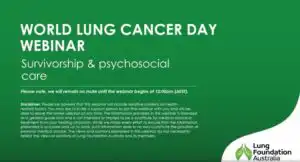In honor of World Lung Cancer Day, Lung Foundation Australia hosted an insightful webinar focusing on survivorship and psychosocial care for lung cancer patients. The event featured a diverse panel of specialist lung cancer nurses and consumers living with lung cancer. Together, they delved into the multifaceted challenges faced by individuals navigating life after lung cancer treatment. Key topics included emotional well-being, social support, and practical strategies for managing long-term health.
The webinar addressed four critical questions submitted by participants. The first question was, what does follow-up care and monitoring look like for lung cancer survivors? Follow-up care for lung cancer survivors typically involves regular medical check-ups, imaging tests, and monitoring for any signs of recurrence. The frequency and type of follow-up care can vary based on individual health status and treatment history. It is essential for survivors to maintain open communication with their healthcare team to ensure timely interventions if needed. How do you manage the fear of recurrence and scanxiety?
Managing the fear of recurrence, often referred to as “scanxiety,” involves a combination of psychological support, mindfulness practices, and staying informed about one’s health. Many survivors find it helpful to engage in counseling or support groups where they can share their experiences and coping strategies. Mindfulness techniques, such as meditation and deep breathing exercises, can also help alleviate anxiety. What support or resources have you found most helpful in maintaining your mental well-being in your daily life? Survivors highlighted the importance of having access to mental health resources, such as counseling services and support groups. Additionally, engaging in physical activities, maintaining a healthy diet, and staying connected with loved ones were cited as crucial for mental well-being. Many also emphasized the value of educational resources that provide information about living with and beyond cancer. How do I navigate the financial and practical aspects of post-treatment? Navigating the financial and practical aspects of post-treatment can be challenging.
The panel recommended seeking assistance from social workers or financial counselors who specialize in cancer care. They can help identify available resources, such as grants, insurance coverage, and community support programs. Practical strategies include budgeting, exploring employment options, and understanding one’s rights and benefits. The role of a lung cancer nurse in coordinating care among different healthcare providers was also discussed. Lung cancer nurses play a pivotal role in ensuring seamless communication and coordination between various specialists, helping to create a comprehensive and cohesive care plan for survivors. They act as advocates for patients, providing education, support, and guidance throughout the survivorship journey.
Was this page helpful?
Good job! Please give your positive feedback
How could we improve this post? Please Help us.
